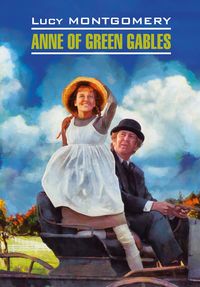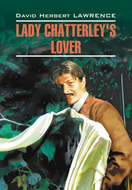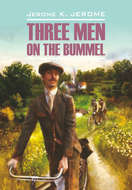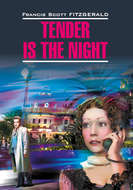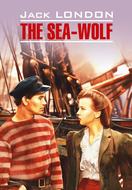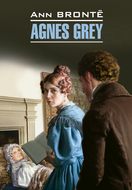Kitabı oku: «Anne of Green Gables / Энн из Зеленых Мезонинов. Книга для чтения на английском языке», sayfa 3
Chapter IV
Morning at Green Gables
It was broad daylight when Anne awoke and sat up in bed, staring confusedly at the window through which a flood of cheery sunshine was pouring and outside of which something white and feathery waved across glimpses of blue sky.
For a moment she could not remember where she was. First came a delightful thrill, as something very pleasant; then a horrible remembrance. This was Green Gables and they didn’t want her because she wasn’t a boy!
But it was morning and, yes, it was a cherry-tree in full bloom outside of her window. With a bound she was out of bed and across the floor. She pushed up the sash – it went up stiffly and creakily, as if it hadn’t been opened for a long time, which was the case; and it stuck so tight that nothing was needed to hold it up.
Anne dropped on her knees and gazed out into the June morning, her eyes glistening with delight. Oh, wasn’t it beautiful? Wasn’t it a lovely place? Suppose she wasn’t really going to stay here! She would imagine she was. There was scope for imagination here.
A huge cherry-tree grew outside, so close that its boughs tapped against the house, and it was so thick-set with blossoms that hardly a leaf was to be seen. On both sides of the house was a big orchard, one of apple-trees and one of cherry-trees, also showered over with blossoms; and their grass was all sprinkled with dandelions. In the garden below were lilac-trees purple with flowers, and their dizzily sweet fragrance drifted up to the window on the morning wind.
Below the garden a green field lush with clover sloped down to the hollow where the brook ran and where scores of white birches grew, upspringing airily out of an undergrowth suggestive of delightful possibilities in ferns and mosses and woodsy things generally. Beyond it was a hill, green and feathery with spruce and fir; there was a gap in it where the gray gable end of the little house she had seen from the other side of the Lake of Shining Waters was visible.
Off to the left were the big barns and beyond them, away down over green, low-sloping fields, was a sparkling blue glimpse of sea.
Anne’s beauty-loving eyes lingered on it all, taking everything greedily in. She had looked on so many unlovely places in her life, poor child; but this was as lovely as anything she had ever dreamed.
She knelt there, lost to everything but the loveliness around her, until she was startled by a hand on her shoulder. Marilla had come in unheard by the small dreamer.
“It’s time you were dressed,” she said curtly.
Marilla really did not know how to talk to the child, and her uncomfortable ignorance made her crisp and curt when she did not mean to be.
Anne stood up and drew a long breath.
“Oh, isn’t it wonderful?” she said, waving her hand comprehensively at the good world outside.
“It’s a big tree,” said Marilla, “and it blooms great, but the fruit don’t amount to much never25 – small and wormy.”
“Oh, I don’t mean just the tree; of course it’s lovely – yes, it’s radiantly lovely – it blooms as if it meant it – but I meant everything, the garden and the orchard and the brook and the woods, the whole big dear world. Don’t you feel as if you just loved the world on a morning like this? And I can hear the brook laughing all the way up here. Have you ever noticed what cheerful things brooks are? They’re always laughing. Even in winter-time I’ve heard them under the ice. I’m so glad there’s a brook near Green Gables. Perhaps you think it doesn’t make any difference to me when you’re not going to keep me, but it does. I shall always like to remember that there is a brook at Green Gables even if I never see it again. If there wasn’t a brook I’d be haunted by the uncomfortable feeling that there ought to be one. I’m not in the depths of despair this morning. I never can be in the morning. Isn’t it a splendid thing that there are mornings? But I feel very sad. I’ve just been imagining that it was really me you wanted after all and that I was to stay here for ever and ever. It was a great comfort while it lasted. But the worst of imagining things is that the time comes when you have to stop and that hurts.”
“You’d better get dressed and come downstairs and never mind your imaginings,” said Marilla as soon as she could get a word in edgewise26. “Breakfast is waiting. Wash your face and comb your hair. Leave the window up and turn your bedclothes back over the foot of the bed. Be as smart as you can.”
Anne could evidently be smart to some purpose for she was downstairs in ten minutes’ time, with her clothes neatly on, her hair brushed and braided, her face washed, and a comfortable consciousness pervading her soul that she had fulfilled all Marilla’s requirements. As a matter of fact, however, she had forgotten to turn back the bedclothes.
“I’m pretty hungry this morning,” she announced as she slipped into the chair Marilla placed for her. “The world doesn’t seem such a howling wilderness as it did last night. I’m so glad it’s a sunshiny morning. But I like rainy mornings real well, too. All sorts of mornings are interesting, don’t you think? You don’t know what’s going to happen through the day, and there’s so much scope for imagination. But I’m glad it’s not rainy today because it’s easier to be cheerful and bear up under afliction on a sunshiny day. I feel that I have a good deal to bear up under. It’s all very well to read about sorrows and imagine yourself living through them heroically, but it’s not so nice when you really come to have them, is it?”
“For pity’s sake hold your tongue,” said Marilla. “You talk entirely too much for a little girl.”
Thereupon Anne held her tongue so obediently and thoroughly that her continued silence made Marilla rather nervous, as if in the presence of something not exactly natural. Matthew also held his tongue, – but this was natural, – so that the meal was a very silent one.
As it progressed Anne became more and more abstracted, eating mechanically, with her big eyes fixed unswervingly and unseeingly on the sky outside the window. This made Marilla more nervous than ever; she had an uncomfortable feeling that while this odd child’s body might be there at the table her spirit was far away in some remote airy cloudland, borne aloft on the wings of imagination. Who would want such a child about the place?
Yet Matthew wished to keep her, of all unaccountable things! Marilla felt that he wanted it just as much this morning as he had the night before, and that he would go on wanting it. That was Matthew’s way – take a whim into his head and cling to it with the most amazing silent persistency – a persistency ten times more potent and effectual in its very silence than if he had talked it out.
When the meal was ended Anne came out of her reverie and offered to wash the dishes.
“Can you wash dishes right?” asked Marilla distrustfully.
“Pretty well. I’m better at looking after children, though. I’ve had so much experience at that. It’s such a pity you haven’t any here for me to look after.”
“I don’t feel as if I wanted any more children to look after than I’ve got at present. You’re problem enough in all conscience27. What’s to be done with you I don’t know. Matthew is a most ridiculous man.”
“I think he’s lovely,” said Anne reproachfully. “He is so very sympathetic. He didn’t mind how much I talked – he seemed to like it. I felt that he was a kindred spirit as soon as ever I saw him.”
“You’re both queer enough, if that’s what you mean by kindred spirits,” said Marilla with a sniff. “Yes, you may wash the dishes. Take plenty of hot water, and be sure you dry them well. I’ve got enough to attend to this morning for I’ll have to drive over to White Sands in the afternoon and see Mrs. Spencer. You’ll come with me and we’ll settle what’s to be done with you. After you’ve finished the dishes go upstairs and make your bed.”
Anne washed the dishes deftly enough, as Marilla who kept a sharp eye on the process, discerned. Later on she made her bed less successfully, for she had never learned the art of wrestling with a feather tick. But is was done somehow and smoothed down; and then Marilla, to get rid of her, told her she might go out-of-doors and amuse herself until dinner time.
Anne flew to the door, face alight, eyes glowing. On the very threshold she stopped short, wheeled about, came back and sat down by the table, light and glow as effectually blotted out as if some one had clapped an extinguisher on her.
“What’s the matter now?” demanded Marilla.
“I don’t dare go out,” said Anne, in the tone of a martyr relinquishing all earthly joys. “If I can’t stay here there is no use in my loving Green Gables. And if I go out there and get acquainted with all those trees and flowers and the orchard and the brook I’ll not be able to help loving it. It’s hard enough now, so I won’t make it any harder. I want to go out so much – everything seems to be calling to me, ‘Anne, Anne, come out to us. Anne, Anne, we want a playmate’ – but it’s better not. There is no use in loving things if you have to be torn from them, is there? And it’s so hard to keep from loving things, isn’t it? That was why I was so glad when I thought I was going to live here. I thought I’d have so many things to love and nothing to hinder me. But that brief dream is over. I am resigned to my fate now, so I don’t think I’ll go out for fear I’ll get unresigned again. What is the name of that geranium on the window-sill, please?”
“That’s the apple-scented geranium.”
“Oh, I don’t mean that sort of a name. I mean just a name you gave it yourself. Didn’t you give it a name? May I give it one then? May I call it – let me see – Bonny would do – may I call it Bonny while I’m here? Oh, do let me!”
“Goodness, I don’t care. But where on earth is the sense of naming a geranium?”
“Oh, I like things to have handles even if they are only geraniums. It makes them seem more like people. How do you know but that it hurts a geranium’s feelings just to be called a geranium and nothing else? You wouldn’t like to be called nothing but a woman all the time. Yes, I shall call it Bonny. I named that cherry-tree outside my bedroom window this morning. I called it Snow Queen because it was so white. Of course, it won’t always be in blossom, but one can imagine that it is, can’t one?”
“I never in all my life saw or heard anything to equal her,” muttered Marilla, beating a retreat down to the cellar after potatoes. “She is kind of interesting as Matthew says. I can feel already that I’m wondering what on earth she’ll say next. She’ll be casting a spell over me, too. She’s cast it over Matthew. That look he gave me when he went out said everything he said or hinted last night over again. I wish he was like other men and would talk things out. A body could answer back then and argue him into reason28. But what’s to be done with a man who just looks?”
Anne had relapsed into reverie, with her chin in her hands and her eyes on the sky, when Marilla returned from her cellar pilgrimage. There Marilla left her until the early dinner was on the table.
“I suppose I can have the mare and buggy this afternoon, Matthew?” said Marilla.
Matthew nodded and looked wistfully at Anne. Marilla intercepted the look and said grimly:
“I’m going to drive over to White Sands and settle this thing. I’ll take Anne with me and Mrs. Spencer will probably make arrangements to send her back to Nova Scotia at once. I’ll set your tea out for you and I’ll be home in time to milk the cows.”
Still Matthew said nothing and Marilla had a sense of having wasted words and breath. There is nothing more aggravating than a man who won’t talk back – unless it is a woman who won’t.
Matthew hitched the sorrel into the buggy in due time and Marilla and Anne set off. Matthew opened the yard gate for them and as they drove slowly through, he said, to nobody in particular as it seemed:
“Little Jerry Buote from the Creek was here this morning, and I told him I guessed I’d hire him for the summer.”
Marilla made no reply, but she hit the unlucky sorrel such a vicious clip with the whip that the fat mare, unused to such treatment, whizzed indignantly down the lane at an alarming pace. Marilla looked back once as the buggy bounced along and saw that aggravating Matthew leaning over the gate, looking wistfully after them.
Chapter V
Anne’s History
“Do you know,” said Anne confidentially, “I’ve made up my mind to enjoy this drive. It’s been my experience that you can nearly always enjoy things if you make up your mind firmly that you will. Of course, you must make it up firmly. I am not going to think about going back to the asylum while we’re having our drive. I’m just going to think about the drive. Oh, look, there’s one little early wild rose out! Isn’t it lovely? Don’t you think it must be glad to be a rose? Wouldn’t it be nice if roses could talk? I’m sure they could tell us such lovely things. And isn’t pink the most bewitching color in the world? I love it, but I can’t wear it. Red-headed people can’t wear pink, not even in imagination. Did you ever know of anybody whose hair was red when she was young, but got to be another color when she grew up?”
“No, I don’t know as I ever did,” said Marilla mercilessly, “and I shouldn’t think it likely to happen in your case either.”
Anne sighed.
“Well, that is another hope gone. ‘My life is a perfect graveyard of buried hopes.’ That’s a sentence I read in a book once, and I say it over to comfort myself whenever I’m disappointed in anything.”
“I don’t see where the comforting comes in myself29,” said Marilla.
“Why, because it sounds so nice and romantic, just as if I were a heroine in a book, you know. I am so fond of romantic things, and a graveyard full of buried hopes is about as romantic a thing as one can imagine isn’t it? I’m rather glad I have one. Are we going across the Lake of Shining Waters today?”
“We’re not going over Barry’s pond, if that’s what you mean by your Lake of Shining Waters. We’re going by the shore road.”
“Shore road sounds nice,” said Anne dreamily. “Is it as nice as it sounds? Just when you said ‘shore road’ I saw it in a picture in my mind, as quick as that! And White Sands is a pretty name, too; but I don’t like it as well as Avonlea. Avonlea is a lovely name. It just sounds like music. How far is it to White Sands?”
“It’s five miles; and as you’re evidently bent on talking you might as well talk to some purpose by telling me what you know about yourself.”
“Oh, what I know about myself isn’t really worth telling,” said Anne eagerly. “If you’ll only let me tell you what I imagine about myself you’ll think it ever so much more interesting.”
“No, I don’t want any of your imaginings. Just you stick to bald facts30. Begin at the beginning. Where were you born and how old are you?”
“I was eleven last March,” said Anne, resigning herself to bald facts with a little sigh. “And I was born in Bolingbroke, Nova Scotia. My father’s name was Walter Shirley, and he was a teacher in the Bolingbroke High School. My mother’s name was Bertha Shirley. Aren’t Walter and Bertha lovely names? I’m so glad my parents had nice names. It would be a real disgrace to have a father named – well, say Jedediah, wouldn’t it?”
“I guess it doesn’t matter what a person’s name is as long as he behaves himself,” said Marilla, feeling herself called upon to inculcate a good and useful moral.
“Well, I don’t know.” Anne looked thoughtful. “I read in a book once that a rose by any other name would smell as sweet31, but I’ve never been able to believe it. I don’t believe a rose would be as nice if it was called a thistle or a skunk cabbage. I suppose my father could have been a good man even if he had been called Jedediah; but I’m sure it would have been a cross. Well, my mother was a teacher in the High school, too, but when she married father she gave up teaching, of course. A husband was enough responsibility. Mrs. Thomas said that they were a pair of babies and as poor as church mice. They went to live in a weeny-teeny little yellow house in Bolingbroke. I’ve never seen that house, but I’ve imagined it thousands of times. I think it must have had honeysuckle over the parlor window and lilacs in the front yard and lilies-of-the-valley just inside the gate. Yes, and muslin curtains in all the windows. Muslin curtains give a house such an air. I was born in that house. Mrs. Thomas said I was the homeliest baby she ever saw, I was so scrawny and tiny and nothing but eyes, but that mother thought I was perfectly beautiful. I should think a mother would be a better judge than a poor woman who came in to scrub32, wouldn’t you? I’m glad she was satisfied with me anyhow, I would feel so sad if I thought I was a disappointment to her – because she didn’t live very long after that, you see. She died of fever when I was just three months old. I do wish she’d lived long enough for me to remember calling her mother. I think it would be so sweet to say ‘mother,’ don’t you? And father died four days afterwards from fever too. That left me an orphan and folks were at their wits’ end33, so Mrs. Thomas said, what to do with me. You see, nobody wanted me even then. It seems to be my fate. Father and mother had both come from places far away and it was well known they hadn’t any relatives living. Finally Mrs. Thomas said she’d take me, though she was poor and had a drunken husband. She brought me up by hand. Do you know if there is anything in being brought up by hand that ought to make people who are brought up that way better than other people? Because whenever I was naughty Mrs. Thomas would ask me how I could be such a bad girl when she had brought me up by hand – reproachful-like.
“Mr. and Mrs. Thomas moved away from Bolingbroke to Marysville, and I lived with them until I was eight years old. I helped look after the Thomas children – there were four of them younger than me – and I can tell you they took a lot of looking after34. Then Mr. Thomas was killed falling under a train and his mother offered to take Mrs. Thomas and the children, but she didn’t want me. Mrs. Thomas was at her wits’ end, so she said, what to do with me. Then Mrs. Hammond from up the river came down and said she’d take me, seeing I was handy with children, and I went up the river to live with her in a little clearing among the stumps. It was a very lonesome place. I’m sure I could never have lived there if I hadn’t had an imagination. Mr. Hammond worked a little sawmill up there, and Mrs. Hammond had eight children. She had twins three times. I like babies in moderation, but twins three times in succession is too much. I told Mrs. Hammond so firmly, when the last pair came. I used to get so dreadfully tired carrying them about.
“I lived up river with Mrs. Hammond over two years, and then Mr. Hammond died and Mrs. Hammond broke up housekeeping. She divided her children among her relatives and went to the States. I had to go to the asylum at Hopeton, because nobody would take me. They didn’t want me at the asylum, either; they said they were overcrowded as it was. But they had to take me and I was there four months until Mrs. Spencer came.”
Anne finished up with another sigh, of relief this time. Evidently she did not like talking about her experiences in a world that had not wanted her.
“Did you ever go to school?” demanded Marilla, turning the sorrel mare down the shore road.
“Not a great deal. I went a little the last year I stayed with Mrs. Thomas. When I went up river we were so far from a school that I couldn’t walk it in winter and there was a vacation in summer, so I could only go in the spring and fall. But of course I went while I was at the asylum. I can read pretty well and I know ever so many pieces of poetry off by heart – ‘The Battle of Hohenlinden’ and ‘Edinburgh after Flodden,’ and ‘Bingen of the Rhine,’ and most of the ‘Lady of the Lake’ and most of ‘The Seasons’ by James Thompson. Don’t you just love poetry that gives you a crinkly feeling up and down your back? There is a piece in the Fifth Reader35 – ‘The Downfall of Poland’ – that is just full of thrills. Of course, I wasn’t in the Fifth Reader – I was only in the Fourth – but the big girls used to lend me theirs to read.”
“Were those women – Mrs. Thomas and Mrs. Hammond – good to you?” asked Marilla, looking at Anne out of the corner of her eye.
“O-o-o-h,” faltered Anne. Her sensitive little face suddenly flushed scarlet and embarrassment sat on her brow. “Oh, they meant to be – I know they meant to be just as good and kind as possible. And when people mean to be good to you, you don’t mind very much when they’re not quite – always. They had a good deal to worry them, you know. It’s a very trying to have a drunken husband, you see; and it must be very trying to have twins three times in succession, don’t you think? But I feel sure they meant to be good to me.”
Marilla asked no more questions. Anne gave herself up to a silent rapture over the shore road and Marilla guided the sorrel abstractedly while she pondered deeply. Pity was suddenly stirring in her heart for the child. What a starved, unloved life she had had – a life of drudgery and poverty and neglect; for Marilla was shrewd enough to read between the lines of Anne’s history and divine the truth. No wonder she had been so delighted at the prospect of a real home. It was a pity she had to be sent back. What if she, Marilla, should indulge Matthew’s unaccountable whim and let her stay? He was set on it; and the child seemed a nice, teachable little thing.
“She’s got too much to say,” thought Marilla, “but she might be trained out of that. And there’s nothing rude or slangy in what she does say. She’s ladylike. It’s likely her people were nice folks.”
The shore road was “woodsy and wild and lonesome.” On the right hand, scrub firs, their spirits quite unbroken by long years of tussle with the gulf winds, grew thickly. On the left were the steep red sandstone cliffs, so near the track in places that a mare of less steadiness than the sorrel might have tried the nerves of the people behind her. Down at the base of the cliffs were heaps of surf-worn rocks or little sandy coves inlaid with pebbles as with ocean jewels; beyond lay the sea, shimmering and blue, and over it soared the gulls, their pinions flashing silvery in the sunlight.
“Isn’t the sea wonderful?” said Anne, rousing from a long, wide-eyed silence. “Once, when I lived in Marysville, Mr. Thomas hired an express wagon and took us all to spend the day at the shore ten miles away. I enjoyed every moment of that day, even if I had to look after the children all the time. I lived it over in happy dreams for years. But this shore is nicer than the Marysville shore. Aren’t those gulls splendid? Would you like to be a gull? I think I would – that is, if I couldn’t be a human girl. Don’t you think it would be nice to wake up at sunrise and swoop down over the water and away out over that lovely blue all day; and then at night to fly back to one’s nest? Oh, I can just imagine myself doing it. What big house is that just ahead, please?”
“That’s the White Sands Hotel. Mr. Kirke runs it, but the season hasn’t begun yet. There are heaps of Americans come there for the summer. They think this shore is just about right.”
“I was afraid it might be Mrs. Spencer’s place,” said Anne mournfully. “I don’t want to get there. Somehow, it will seem like the end of everything.”
the fruit don’t amount to much never – (разг.) а фрукты получаются никудышные
[Закрыть]
could get a word in edgewise – (разг.) смогла вставить хоть слово
[Закрыть]
in all conscience – (разг.) по совести говоря; бесспорно; поистине
[Закрыть]
argue him into reason – (уст.) переубедить его
[Закрыть]
I don’t see where the comforting comes in myself – (разг.) Я что-то не вижу в этой фразе ничего утешительного
[Закрыть]
stick to bald facts – (разг.) строго придерживаться фактов
[Закрыть]
a rose by any other name would smell as sweet – «Роза пахнет розой, хоть розой назови ее, хоть нет» – В. Шекспир. «Ромео и Джульетта». Перевод Б. Пастернака. Акт II, сцена II.
[Закрыть]
poor woman who came in to scrub – (разг.) приходящая уборщица
[Закрыть]
were at their wits’ end – (разг.) были в крайнем недоумении
[Закрыть]
they took a lot of looking after – (разг.) приглядывать за ними было непростой задачей
[Закрыть]
Fifth Reader – учебник для пятого класса начальной школы, включает в себя рассказы и короткие отрывки произведений для чтения
[Закрыть]
